
Black history at Waterloo in photos
A poster series celebrates Black university members who made their mark

A poster series celebrates Black university members who made their mark
By Ujima Black History MonthInspired by archival photos published with the October 2021 story, A brief history of Black experience at Waterloo, 1960s -1990s, Dr. Christopher Stuart Taylor, associate vice-president Equity, Diversity, Inclusion and Anti-racism, had an idea. He wanted the images of Black faculty and students from our university’s past to be seen in large format in spaces around campus. Running with the idea, staff from the Library and Arts worked to surface more archival photos of Black faculty, students, and staff along with their histories. Information and reflections were also shared by other campus members. The result is a poster series marking Ujima Black History Month 2022.
As you return in February, look for the posters all over campus and learn more about Black contributions at Waterloo. Here's a preview:
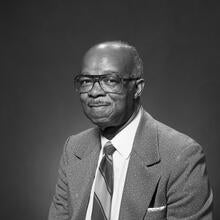 Professor James Harris joined Renison College (now Renison University College), School of Social Work, as a part-time instructor in 1978 and became Associate Professor and Director of Social Work Studies in 1980. Dr. Harris wrote a chapter in Canadian Social Welfare – the first textbook based on Canada’s experiences with social welfare. In 1983 he developed the first social work distance education course at Waterloo, and in 1985 created a new course that combined religion and social work practice.
Professor James Harris joined Renison College (now Renison University College), School of Social Work, as a part-time instructor in 1978 and became Associate Professor and Director of Social Work Studies in 1980. Dr. Harris wrote a chapter in Canadian Social Welfare – the first textbook based on Canada’s experiences with social welfare. In 1983 he developed the first social work distance education course at Waterloo, and in 1985 created a new course that combined religion and social work practice.
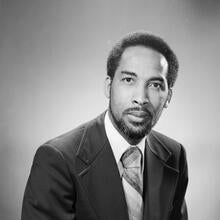 Professor Murchison Callender joined the School of Optometry and Vision Science in 1968, the first Black faculty member in optometry in Canada and possibly in North America. Dr. Callender was known as a wonderful teacher, especially dedicated to graduate students, and was an internationally respected expert in the rapidly growing field of contact lenses throughout the 1970s to the early 2000s when he retired.
Professor Murchison Callender joined the School of Optometry and Vision Science in 1968, the first Black faculty member in optometry in Canada and possibly in North America. Dr. Callender was known as a wonderful teacher, especially dedicated to graduate students, and was an internationally respected expert in the rapidly growing field of contact lenses throughout the 1970s to the early 2000s when he retired.

Professor Donald M. Amoroso (1926-1996) was born in Trinidad. He earned a BA and MA from the University of Toronto and completed his PhD in Clinical Psychology at the University of Waterloo. A member of the Kitchener-Waterloo branch of the John Howard Society and a consultant with Ontario’s correctional services, one of Dr. Amoroso’s areas of study was reactions to and attitudes about pornography.
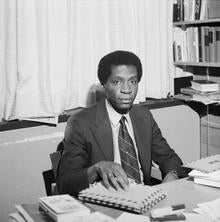 Professor Karl M.H. Bennett specialized in economic development focused on trade policy and finance. He was chair of the Department of Economics from 1981 to 1987 and retired in 2002. During his tenure at Waterloo, he served on the Government of Canada Treasury Board in 1971 and 1982, the UN Caribbean Regional Integration Advisory Team in 1975, and the Ontario Premier’s Council on Economic Renewal from 1991 to 1995.
Professor Karl M.H. Bennett specialized in economic development focused on trade policy and finance. He was chair of the Department of Economics from 1981 to 1987 and retired in 2002. During his tenure at Waterloo, he served on the Government of Canada Treasury Board in 1971 and 1982, the UN Caribbean Regional Integration Advisory Team in 1975, and the Ontario Premier’s Council on Economic Renewal from 1991 to 1995.
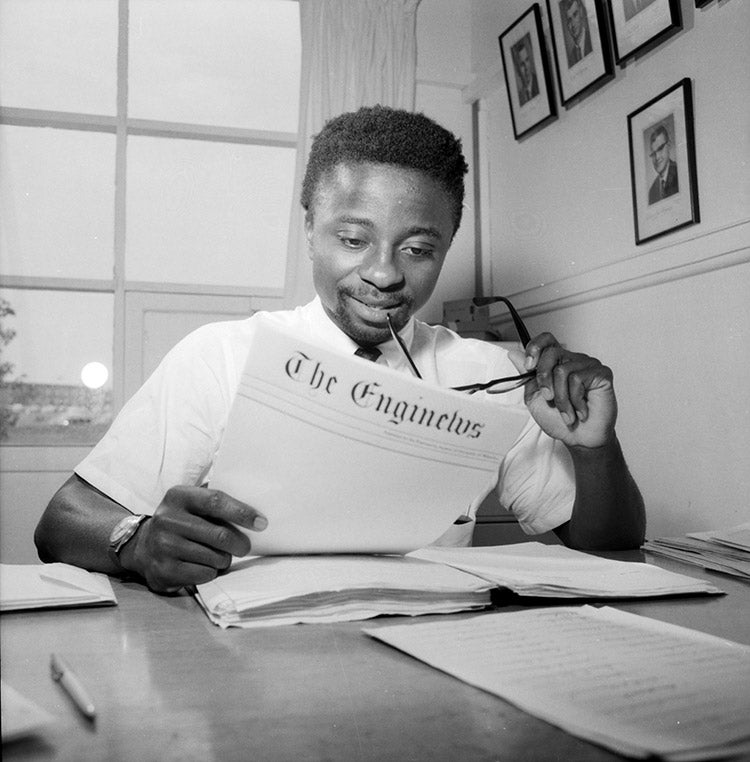 Engineering student Olatokunboh (Toks) Oshinowo (1939-2015) in 1966, reading an edition of The Enginews. Formerly of Nigeria, Oshinowo served as President of the University of Waterloo Engineering Society and co-founded the International Student Association. Drawn to Waterloo because of its co-op and chemical engineering programs, he came to Canada in 1962.
Engineering student Olatokunboh (Toks) Oshinowo (1939-2015) in 1966, reading an edition of The Enginews. Formerly of Nigeria, Oshinowo served as President of the University of Waterloo Engineering Society and co-founded the International Student Association. Drawn to Waterloo because of its co-op and chemical engineering programs, he came to Canada in 1962.
In a 1966 profile in the University of Waterloo Quarterly Report he had the following advice for students new to campus: “To know a country is to meet its people at all levels, and feeling at home and making friends depends on what you put into it.”
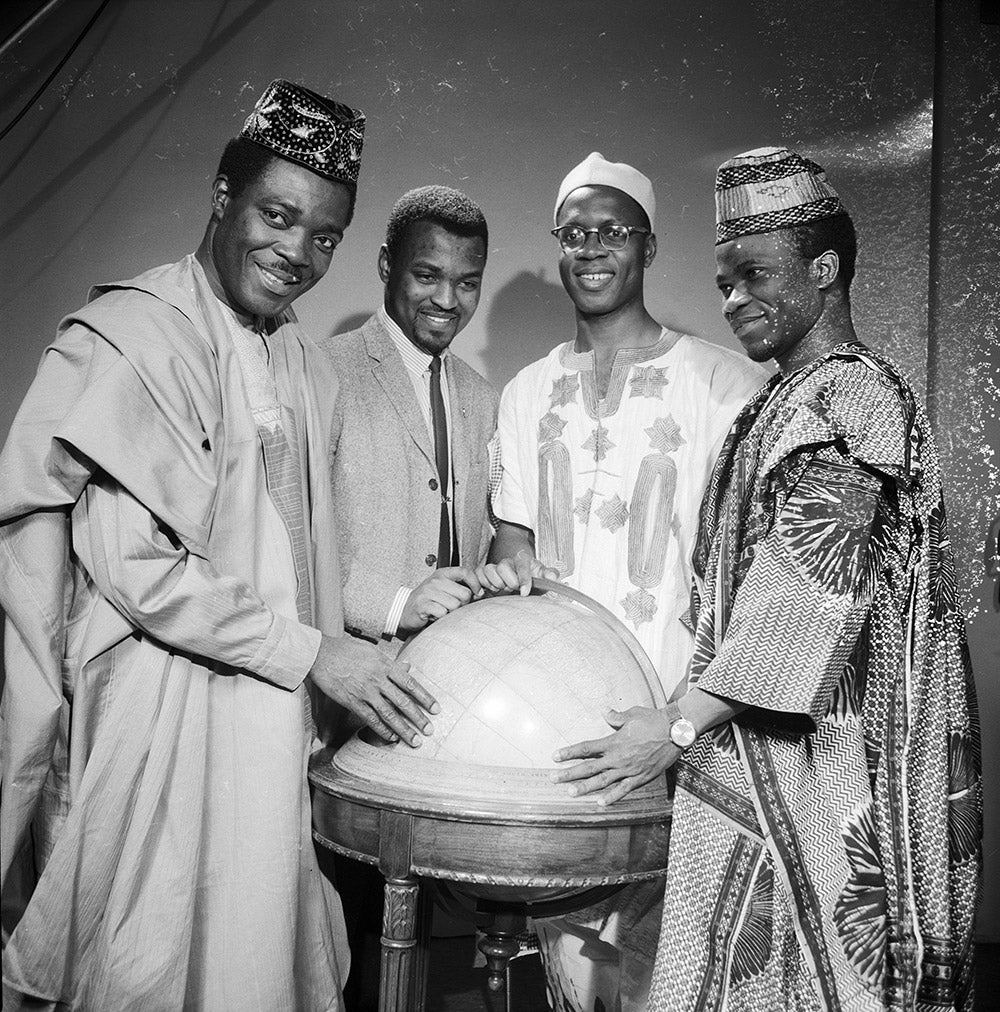
Students (left to right) Ekwele Lobe (Lobe) Nwalipenja, of Kumba, West Cameroon, Ronald S. Edari, of Kenya, Chukuma Nwachuku, of Nigeria, and Oluremi (O'Remi) Balogun, of Nigeria, posed with a globe to mark the launch of the 1966 fundraising campaign for the African Students Foundation, a private organization that raised tuition funds for students from Africa, like themselves, studying at schools in Canada.
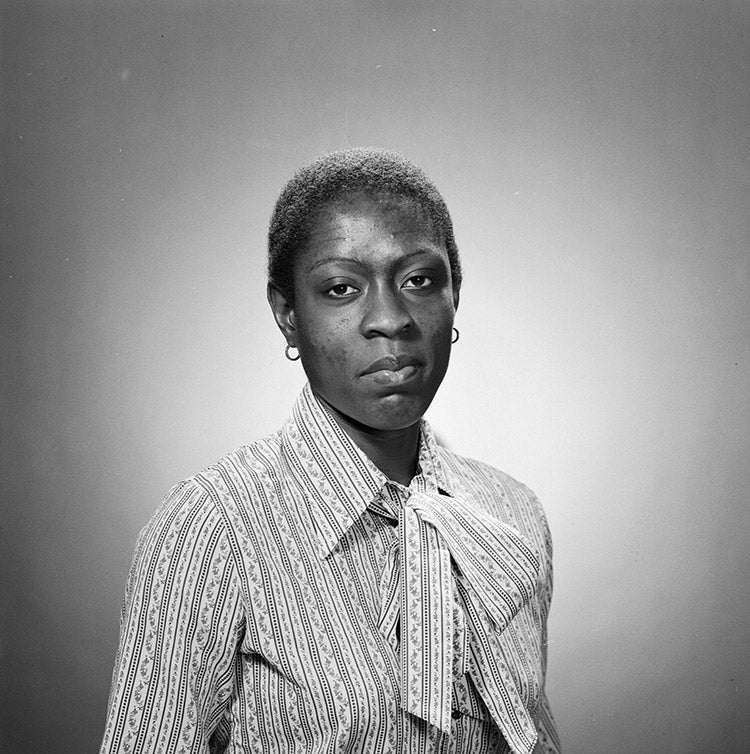 Faye Blackwood photographed as Athlete of the Week in January 1980. She was inducted into Waterloo Warriors Hall of Fame in 2000.
Faye Blackwood photographed as Athlete of the Week in January 1980. She was inducted into Waterloo Warriors Hall of Fame in 2000.
A member of the Warrior Track team from 1976-1981, Blackwood graduated from Waterloo with a BSc Hons Kinesiology in 1981 and went on to a full career in athletics. Her achievements include 1986 Indoor and Outdoor National Champion in 60m and 100m hurdles, and coaching the Canadian Paralympic team for the Barcelona 1992 and Atlanta 1996 games.
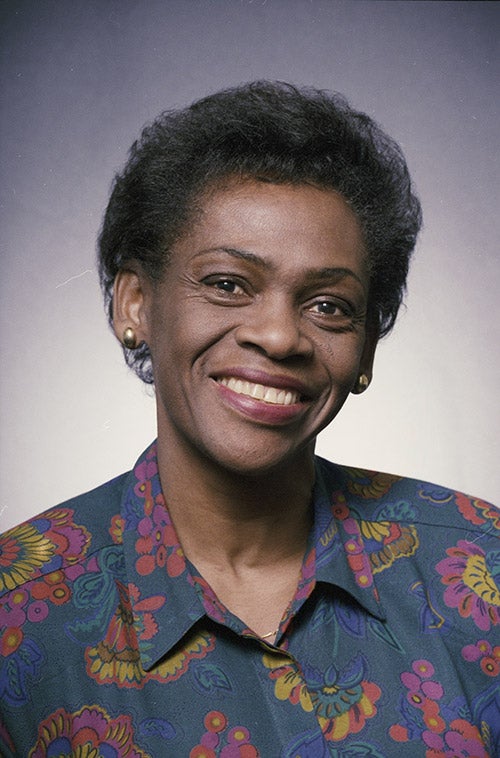 Yulerette Gordon worked at the Library from 1966 to 1968, left to study library science at the University of Toronto, then returned to Waterloo in 1977 and remained here until her retirement in 2004. She held various positions including Assistant Head of Cataloguing and was an Applied Health Sciences Librarian when she retired.
Yulerette Gordon worked at the Library from 1966 to 1968, left to study library science at the University of Toronto, then returned to Waterloo in 1977 and remained here until her retirement in 2004. She held various positions including Assistant Head of Cataloguing and was an Applied Health Sciences Librarian when she retired.
Based on available information, Yuli (to those who knew her well) was the first and only full-time, permanent Black librarian to have worked at the University of Waterloo Library.
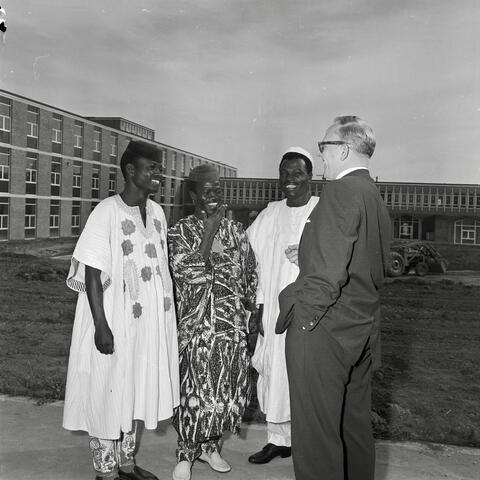
Nigerian engineering students (left to right) Adesanya (Ade) Akadri, Oluremi (O’Remi) Balogun, and Samuel Ilechukwu (1941-2013) chat with Douglas Wright, Dean of Engineering in 1961.
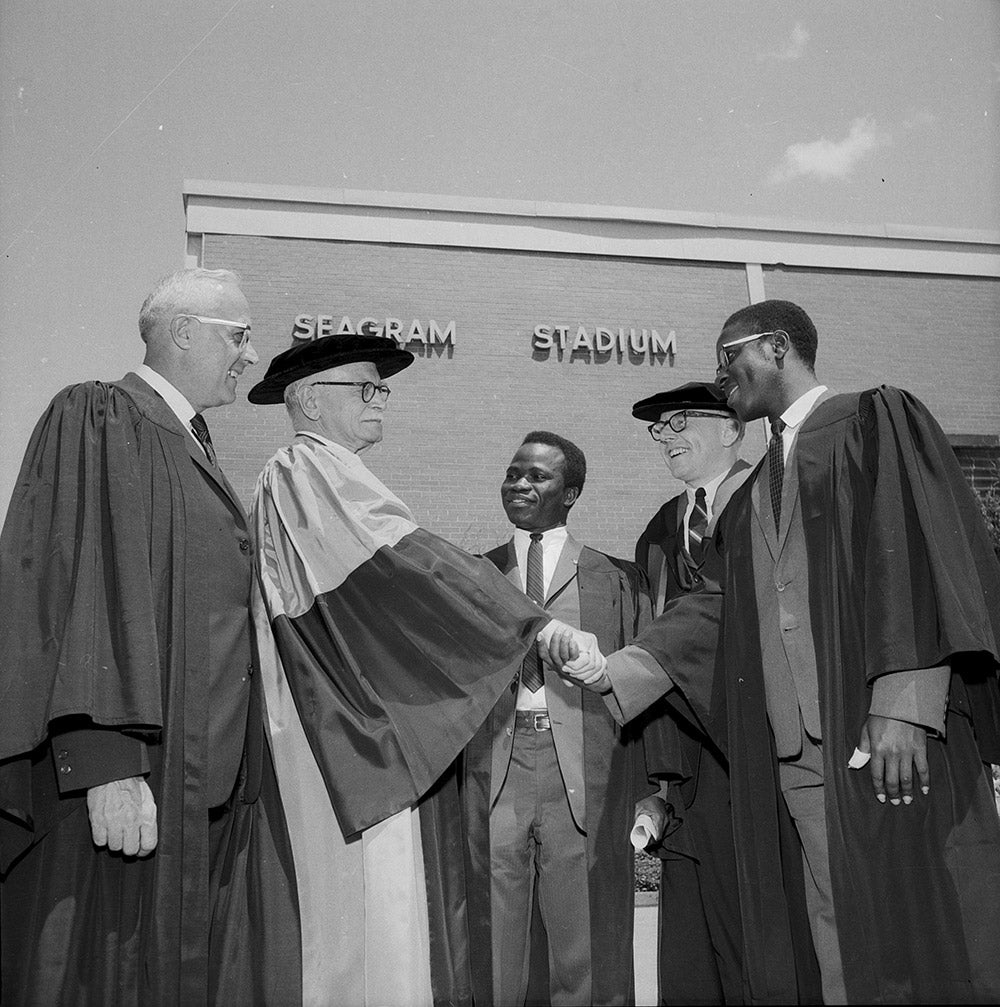
At the 1966 convocation (left to right) Douglas V. Gonder, honorary doctor of laws, Gen. A.G.L. McNaughton, honorary doctor of engineering, Oluremi (O’Remi) Balogun, graduating engineer, Dean Douglas Wright, and Chukuma Nwachuku, graduating engineer.
All archival photos courtesy of the University of Waterloo Library. Special Collections & Archives, Kitchener-Waterloo Record Photographic Negative Collection and University of Waterloo Archives, Graphic Services fonds.
Special thanks to Danielle Robichaud, Digital Archivist, Special Collections & Archives.

Read more
PhD candidate Jonathan Zi En Chan worked with Professor Christopher Taylor to uncover Black student and faculty experiences and the evolution of Black Studies at the University of Waterloo

Designed by Sahra Soudi and Syrus Marcus Ware for the Black And Free Research-Creation Project.
Read more
Professor dedicates her art, research and teaching to understanding Black freedom

Read more
Waterloo prioritizing equity and anti-racism and new and future academic offerings
The University of Waterloo acknowledges that much of our work takes place on the traditional territory of the Neutral, Anishinaabeg, and Haudenosaunee peoples. Our main campus is situated on the Haldimand Tract, the land granted to the Six Nations that includes six miles on each side of the Grand River. Our active work toward reconciliation takes place across our campuses through research, learning, teaching, and community building, and is co-ordinated within the Office of Indigenous Relations.